Biden Bashes Netanyahu While Iran Reaps The Benefits, WSJ Says
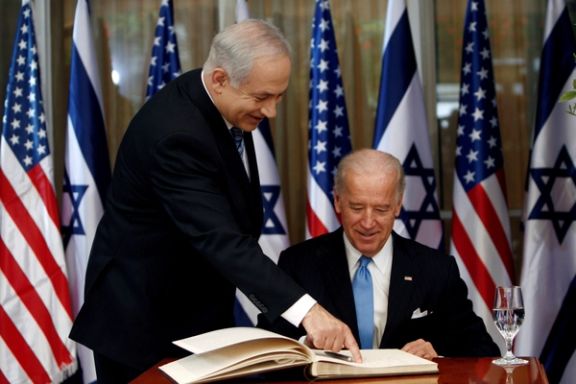
The Wall Street Journal says President Joe Biden’s repeated criticism of Israeli Prime Minister Benjamin Netanyahu, is worse than how he treats “the ruling mullahs in Iran.”

The Wall Street Journal says President Joe Biden’s repeated criticism of Israeli Prime Minister Benjamin Netanyahu, is worse than how he treats “the ruling mullahs in Iran.”
In an editorial on Thursday, the WSJ argued that the Biden administration’s criticisms of Netanyahu’s judicial reforms constitute interference in Israel’s internal affairs, “in which the US President has no business.”
The Journal argued that Biden’s negative comments about Netanyahu’s policies advance the interests of the Islamic Republic of Iran.
“While Mr. Biden undermines the Netanyahu government, Hamas and other Iranian proxies are gaining power in the West Bank, activating another front against Israel. The new wave of terrorism against Jewish civilians will set back the Palestinian cause but advance Iran’s,” the editorial said.
It also criticized Biden for his failure so far to expand the Abraham Accords because of his less than amicable posture toward Saudi Arabia.
“Perhaps most disappointing has been the failure to extend the Trump-brokered Abraham Accords. The Saudis are the prize, but Mr. Biden’s open hostility drove them to hedge their bets by signing a Chinese-brokered deal with Iran instead. Normalization with Israel may have to wait for a U.S. President interested in rallying a coalition to contain Tehran.”
The Wall Street Journal went on the highlight the Biden administration's failure to conclude a “longer and stronger” nuclear deal with Iran, and instead aim for “an unwritten, stopgap agreement “that would give Tehran tens of billions of dollars to sit on the precipice of nuclear breakout. Call it Hezbollah’s and Islamic Jihad’s lucky day.”
The editorial concluded by saying, “While Tehran escalates its proxy wars and whittles down U.S. nuclear demands, Mr. Biden carries out diplomatic offensives against Saudi Arabia and Israel.”
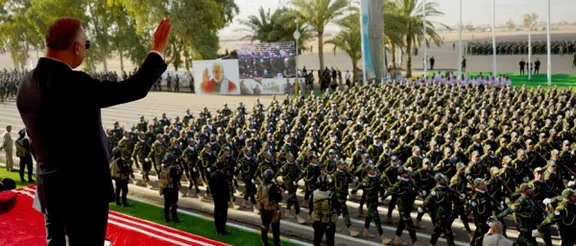
A group of students from Tehran University has expressed opposition to the admission of Iraq’s Hashd al-Shaabi militia forces as students.
In a statement issued on Thursday, the student activists said they would not accept “military forces, whether in combat or school uniforms, within the university premises".
Vowing to resist their presence, which many fear is an attempt to suppress dissidents in the institution, they said that the university’s atmosphere is already poisoned due to the presence of professors affiliated with the regime and Basij militiamen masquerading as students. They accused the authorities of sidelining students by suspending, removing, and suppressing them, while replacing them with borrowed forces from Iraq.
The activists lamented the university's transformation from a symbol of academic independence to a mere instrument of military tyranny, stating, “The presence of these individuals as university administrators only perpetuates a cycle of crises and disasters. Today, we realize that within the minds of those in power, we are denied the right to study and even the right to exist."
In contrast, the student activists highlighted the plight of imprisoned, expelled, and suspended students, who find themselves unjustly excluded for voicing grievances against the regime, while Hashd al-Shaabi forces gain admission.

Al-Hashd al-Shaabi was established back in 2014, following a fatwa to fight ISIS, which controlled four governorates and reached the borders of the capital Baghdad at the time. The Iraqi state-sponsored umbrella organization is composed of approximately 67 different armed factions, with around 128,000 fighters that are mostly Shia Muslim groups, but also include Sunni Muslim, Christian, and Yazidi groups.
Tehran University's public relations office announced members of Iraq's Shiite Hashd al-Shaabi militias and other proxies of the Islamic Republic can study at Iranian universities following a meeting attended between the head of Supreme Leader Ali Khamenei's representatives at the universities and the education deputy of Hashd al-Shaabi.
It has caused outrage among students who also criticized the advantages enjoyed by regime-affiliated students and the rich as well as entrance exam biases, which have discouraged many talented and hardworking individuals from pursuing higher education.
Students hailing from the wealthiest families, and those affiliated with IRGC’s Basij forces as well as those whose family members are war veterans, or what regime calls "martyrs”, have a much greater chance of admission to top universities in Iran, prompting many to blame corruption by the entrance exam ‘mafia’.
The Tehran University students’ statement also emphasized the disparity between the easy entry of members from Hashd al-Shaabi and the obstacles faced by socially and politically marginalized groups within Iranian society. They argued that the university administration's prioritization of military forces over ordinary people and dissidents undermines the principles of equal educational opportunities.
The student movement has played a significant role in the formation and continuation of last year's popular protests, sparked by the death of a 22-year-old woman, Mahsa Amini, in morality police custody. In recent weeks, security forces in Iran have unleashed a fresh wave of crackdowns at universities employing both verbal and physical assault to suppress the student movement.
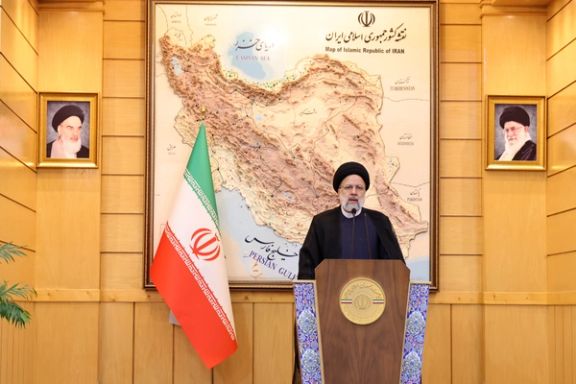
Iran will barter petrochemical products with African countries in exchange for food, President Ebrahim Raisi was quoted as saying after a tour of three countries.
Raisi, who visited Kenya, Zimbabwe and Uganda this week returned to Tehran on Friday and said the first aim of his African tour was to expand “Iran’s strategic depth” on the continent.
Isolated by US and European sanctions, the Islamic Republic has few options to develop economic relations to relieve economic pressure, which has led to very high inflation estimated to range from 70-100 percent. Raisi himself faces sanctions and cannot travel to Western countries.
The official government news website IRNA quoted Raisi as saying that securing “raw materials” and food was the second goal of his trip. He maintained that there is good opportunity for agriculture in Africa and Iran could trade petrochemical products and receive much needed food staples.
All three countries the Iranian president visited are grappling with numerous economic and social crises. Neither Iran nor these African countries have much to offer to each other in trade. However, Raisi said that the Islamic Republic has common ground with the three African countries in opposing “unilateralism”, a reference to Western diplomatic and economic power.
Upon his return to Tehran the president claimed that because of the Islamic revolution Iran has succeeded in establishing wide-ranging ties with many countries around the world. In fact, Iran enjoyed a respected status before the revolution and its citizens had the opportunity of visa-free travel to most countries in the 1970s.
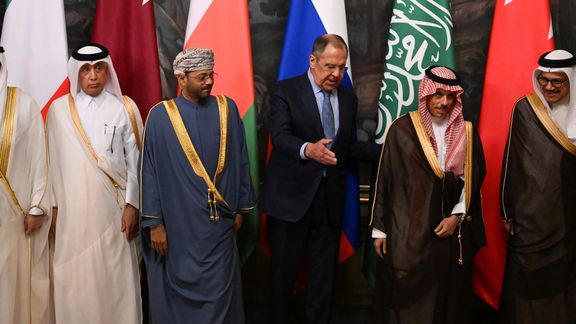
Iranian media continued criticizing Russia for questioning Iran's ownership of three small islands in the Persian Gulf contested by the United Arab Emirates.
Iranian media and social media users were deeply annoyed when Russia joined the Persian Gulf Arab states earlier this week to demand a settlement to the dispute over the ownership of the islands Iran says are its integral part.
The Foreign Ministry summoned Russia's ambassador and Foreign Minister Hossein Amir Abdolahian and government spokesman Ali Bahadori wrote in separate tweets that "Iran will not compromise over its national interests and territorial integrity."
However, Tehran’s official reaction to Russia has been meek. Social media users said officials had indeed made a compromise by not naming Russia in their tweets.
Britain, which maintained control of Abu Musa, and the Greater and Lesser Tunb it had occupied in the 19th century, withdrew its forces from the Persian Gulf in 1971 and the United Arab Emirates was formed. However, Iran’s Imperial government at the time decided to reclaim what it believed were historical Iranian islands.
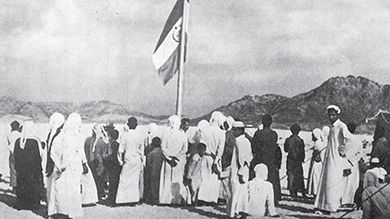
Mohammad Reza Shah sent the Iranian navy to secure all three in November of the same year, two days before UAE was established. Iranian forces remain on the islands, with only Abu Musa having much of a civilian population of several thousand.
In its Thursday edition, conservative newspaper Jomhouri Eslami wrote in a strongly worded editorial: "This is not going to be Russia's last treason against Iran." The daily added: "Foreign Ministry officials should not think that this episode will end by summoning Russia's ambassador. We need an essential revision of our political relations with Russia and forcing Russian statesmen to regret their treason against the Iranian nation."
The daily wrote, Russia's diplomatic move once again proved that those who opposed staunch supporters of Russia in the Iranian government were right.
The daily added that Russia and China are always prepared to undermine all international regulations and ethical rules to serve their own interests.
Asked why Moscow undermined Iran's territorial integrity," international relations analyst Mehdi Motaharnia told Khabar Online that "Russia wishes to put an end to its isolation by sacrificing Iran's interests." Meanwhile, he called Iranian officials' mild reaction "a withdrawal from revolutionary positions."
Meanwhile, Motaharinia said that "Iran's stance on the issue was one of the weakest since the 1979 revolution." He added that Russia's stance about referring the case to the International Court of Justice was tantamount to recognizing the United Arab Emirates' claims about the ownership of the three islands.
This comes, he said, while Iran has always looked at Russia as its strategic partner and has even helped Russia in its war against Ukraine, but Russia has never done anything to prove it is Tehran's strategic partner. On the contrary, he said "Russia's stance was against Iran's territorial integrity."
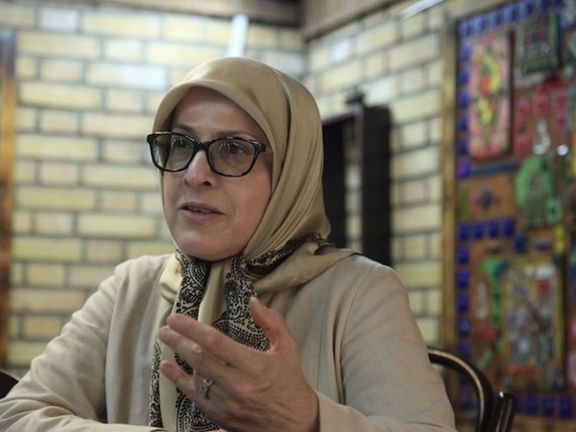
Also, reformist politician Elaheh Koulaei told Etemad Online website: "Russians will never consider Iran's interests in their relations with Iran or any other country." She stated that assuming Russia cares for Iran's interests is totally contradict the realities of international relations.
She echoed other public figures who have said that Iran’s pro-Moscow and pro-Beijing foreign policy has led to an imbalance, without Tehran considering geopolitical facts and Iran's geostrategic requirements. Koulaei added that Teharan’s pro-East foreign policy ignores the need for a balance between relations with East and West. Such a policy cannot serve Iran's national interests.
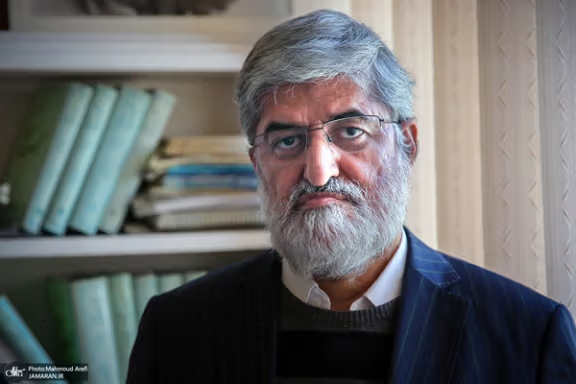
Meanwhile, former lawmaker Ali Motahari wrote in a tweet: "Russia understands that Iran has been isolated because of its radical anti-Western policies and it needs Russia's support."
Motahari added: "Russia's behavior was in fact another warning to Iran and its pro-Russian politicians to stop their pro-Eastern policies and revert to the idea of "neither East nor West" that was its foreign policy motto after the 1979 revolution."
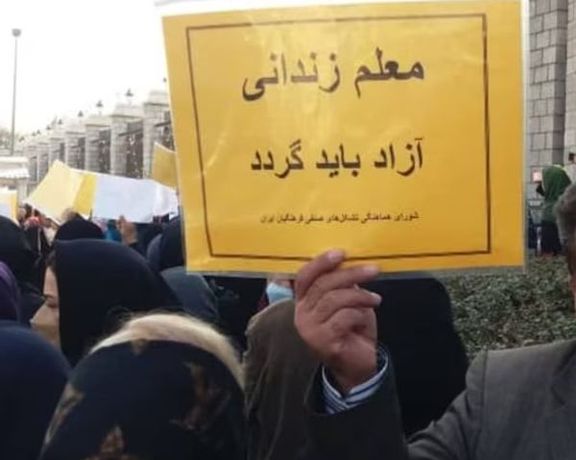
Iranian teachers have launched a campaign to collect 100,000 signatures calling for the release of detained educators and end to their harassment.
Esmail Abdi, a teachers’ union leader who has been in prison since 2015 backed the initiative by sending a message from jail. He said that the extent of repression against teachers has expanded in recent years.
Abdi who was the leader of Tehran Teachers’ Association was sentenced to a six-year term in 2016 but is still in prison.
A current campaign has already collected 10,000 signatures, but teachers’ union members, some in exile, have called for collecting one hundred thousand.
Last week, 1,200 teachers sent a letter to the heads of the three branches of government asking them to release detained union activists and end harassment by security forces and the Judiciary that continues to fabricate legal cases against union members. However, the president and the head of the judiciary refused to accept the letter.
Teachers say that in most likelihood, top state officials think 10,000 signatures represents just one percent of the one million teachers in the country. This is the reason the activists have embarked on collecting 100,000 signatures.
Teachers maintain that they have pursued their demands through peaceful and legal means for two decades, but the Islamic Republic has always dealt with them through force and intimidation.
Teachers have been demanding higher wages and pensions for years, as one of the lowest paid class of government employees. In 2010s, government appointed officials embezzled hundreds of millions of dollars from their pension fund, without any serious consequences.
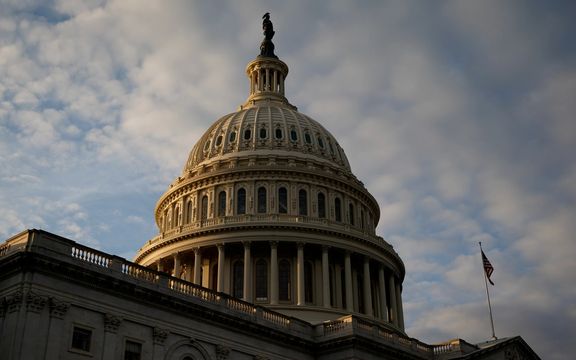
A group of 18 Republican senators have called for a probe into murky circumstances surrounding the State Department’s handling of its Iran envoy’s security clearance investigation.
Spearheaded by Senator Bill Hagerty (R-TN), the group sent a letter to the State Department’s internal watchdog calling for investigation into the suspension of senior diplomat Robert Malley’s security clearance.
“We write to request that the Office of the Inspector General (OIG) conduct an independent investigation into whether State Department officials complied with all appropriate laws and regulations—including policies and procedures described in the State Department’s Foreign Affairs Manual,” read the letter.
Congress was kept in the dark about the developments and was only informed about it when his replacement was announced. Malley’s suspension was first reported by Iran International June 29, and formally announced the following day by Matthew Miller, the spokesperson for the US State Department, calling it "a leave of absence”, adding that his duties would be temporarily assumed by his deputy, Abram Paley. However, it is believed he had been suspended as early as April.
Michael McCaul (R-TX), the chairman of the House of Representatives committee on foreign affairs, wrote to Secretary of State Antony Blinken on June 30 seeking "a full and transparent accounting" about why Malley was suspended and was under investigation. The Senior Republican lawmaker slammed the responseas "absolutely unacceptable"
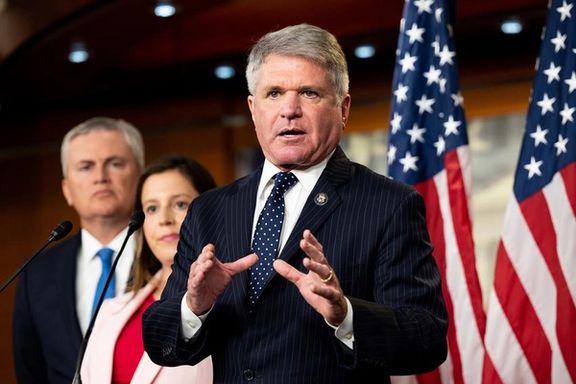
"The Department is not in a position to provide further documents or information related to this personnel-security clearance matter," according to a copy of the correspondence.McCaul said, "Congress deserves to know exactly why the US Special Envoy (for) Iran had his security clearance suspended, was then suspended from his position, and now, according to news reports, is being investigated by the FBI," adding that he would ask the agency for a classified briefing next week.
In their letter to Diana Shaw, the acting inspector general of the Department of State, the senators outlined specific questions that must be answered “no later than Friday, July 21, 2023.”
The senators' questions mainly focused on details such as the exact date Malley’s unpaid leave started and when his security clearance was suspended or when or whether he has turned in all “Department-issued credentials that provide logical or physical access to classified systems or designated classified spaces/facilities."
Several of their questions also pertained to the works of the State Department’s Iran Action Group, given that the Special Envoy is tasked with leading the taskforce. “After the State Department suspended Special Envoy Malley’s clearance, when and how were members of the Iran Action Group expressly directed not to discuss or otherwise share any classified information with Malley?” they asked.

Capitol Hill Republicans are growing increasingly frustrated with the Biden administration’s unwillingness to share information about the issue. Adding salt to the injury, an article by Tehran Times, a publication controlled by the Iranian regime, provided astonishing details about Malley's situation. This has led to concerns that the Iranian government knows more about the issue than US lawmakers.
“You would think the administration would proactively inform Congress that the person in charge of this doesn’t have the clearances to do their job, and that never happened,” said Sen. Marco Rubio (R-FL), one of the signatories of the letter and the top Republican on the Senate Intelligence Committee. “It’s not good.”
Speaking to Iran International’s Arash Alaei this week, Senator Josh Hawley (R-MO) criticized the government for not being forthcoming. He said, "You have a totalitarian regime publishing all this information and knowing it, yet your own government won't be honest with us about it."
He further stated, "It's ridiculous...I feel like I've been lied to... They (the administration) lie to us all the time on various issues, including Afghanistan, Iraq, Iran, China... It's a pattern in this administration."
Republicans and some Democrats have been opposed to President Joe Biden's policy of negotiating with the Islamic Republic to revive the 2015 JCPOA agreement that former President Donald Trump abandoned in 2018. The talks came to a deadlock in September 2022, after 18 months of multilateral diplomacy.
Now with only about one year left from Biden’s first term, even Iran’s allies are not optimistic of resuscitating the comatose accord, with Russian Foreign Minister Sergey Lavrov saying Thursday, "I doubt it would be very realistic to expect this (revival of the JCPOA), with a new administration coming to power in the United States in a year’s time.”
"Who knows whether that administration will be Democratic or Republican. And nobody can guarantee that this new administration would refrain from using the trick of withdrawing from the agreement again," he added.